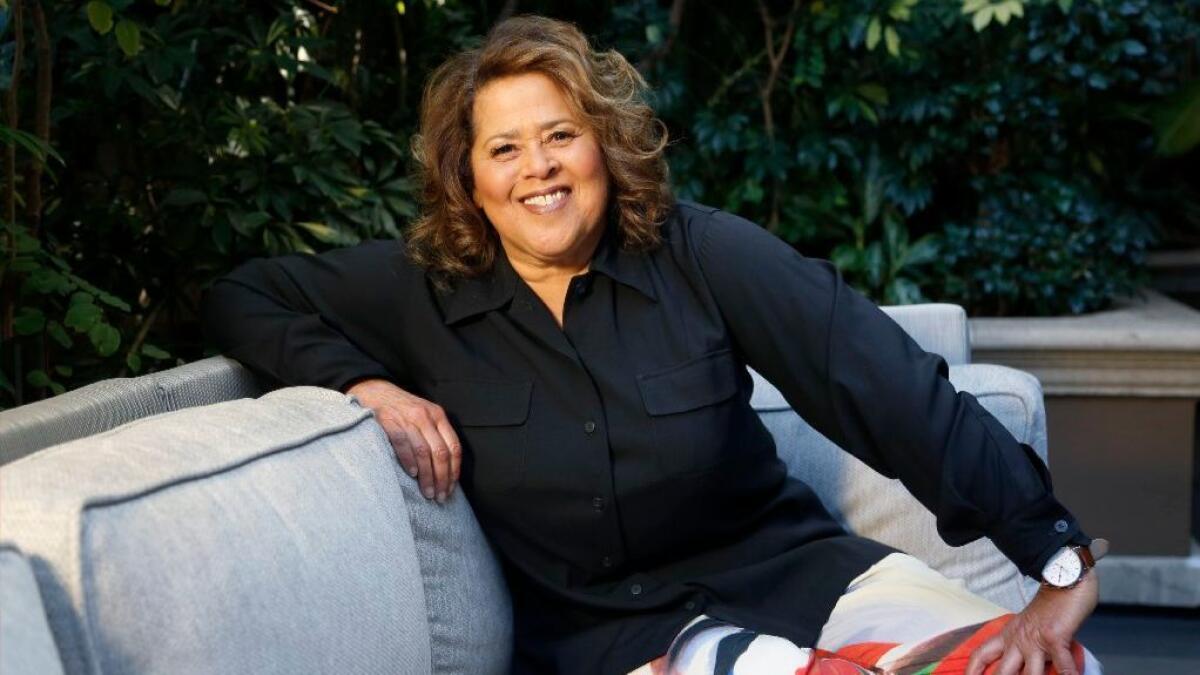Q&A: Anna Deavere Smith talks about taking on real people and Shondaland

Anna Deavere Smith has lived many lives as an actress for hire, moving fluidly between stage, film and television. The Baltimore native has inhabited memorable characters in âThe American Presidentâ and âRachel Getting Marriedâ and on âNurse Jackie,â âThe West Wing,â and most recently âblack-ish.â (She joins the upcoming Shondaland production âFor the People," premiering March 13 on ABC.)
As a playwright and solo performer of her own works, she has given life to dozens more; Deavere Smithâs award-winning one-woman stage productions include âTwilight: Los Angeles, 1992â and 2008âs âLet Me Down Easy.â
Her latest, âNotes From the Field,â makes the transition from stage to HBO on Feb. 24. To examine a host of thorny issues including race, police shootings and the high school-to-prison pipeline, Smith conducted 250 interviews to create the piece, zeroing in on 19 real people, all of whom she plays. They include Rep. John Lewis and activist Bree Newsome, as well as teachers, inmates and students. The work, naturally, has a heaviness as it explores systemic racism, but it also has lighter moments and highlights the need to keep pushing for dialogue no matter how difficult those conversations may be.
We recently sat for a chat with Smith over lunch in Beverly Hills and she discussed representing real people, spending election night with Justin Timberlake and working with Shonda Rhimes.
Do you feel an extra sense of responsibility in your one-woman projects since you are portraying real people?
I don't use that word. I think about the opportunity I have to get the song right, and to get the dance right. Because to me, anybody who ends up in one of my plays has a kind of communicative genius. Somebody like Kevin Moore â the second character â who spent most of his young life in jail. He read the dictionary backwards and forwards in jail. He's perfect. When I woke up this morning, I was thinking about [a trait of] Kevin that I still don't have right. I've got to go back and listen to it again, because why does it sound like me? That's what it is. I don't feel as much a responsibility as I feel an opportunity to take these extraordinary, expressive moments and get it right.
Your plays are not sequels per se, but they sometimes touch on overlapping topics. Do you think of them as being connected?
I think it comes down to justice and death. âLet Me Down Easyâ was supposedly about healthcare, it was really about death and loss. So I think I'm very interested in loss, and if there's anything we can possibly do to correct it or stop it. âA Lack of Justiceâ is about loss, and I'm interested in that for some reason.
But amid the loss â of life, of rights, of human dignity â there is a sense of hope at the end of âNotes From the Field,â in John Lewis talking about forgiveness and the potential for change.
To me, the hopeful moment in him is when he says, "Keep the faith, never lose faith." That's important. It's not just about reconciliation, I think then people miss the point â âCan we all get along?â â in a way, because it's dangerous to end with that. You let white people off the hook. You could, but to me, inside of that is the dignity of struggle and the opportunity to struggle.
Do you feel like the work changes substantially when you move it from stage to screen? That anything is lost in translation? Or is it simply an opportunity to get in front of more people?
The only thing I lose is, and it's always hard, is capturing the audience. As my friend George Wolfe, the great theater director once said to me, âBaby, people come to your theater to cry, and mine to laugh." (Laughs.)
I feel I'm successful if audience members tell me that they had something like a cathartic experience emotionally. And that's why I'm in the theater. But the benefit of the film is, it's going to reach more people. I'll be able to take these screenings to people who don't watch HBO. I'll be able to go to schools and stuff.
In March youâll be starring in âFor the People.â Is this your first time working with Shonda?
Yes. My first trip in Shondaland. I got to know her a little bit when we were both on â I still call him the president â the committee for Obama's library. Honestly, I would not have taken a pilot, which it was at the time, if it weren't that it was Shondaland. Because to do it, I had to forgo a year of touring my play around the country. Which is my mission, you know? So I had to gamble on that. I thought, âWell, I've never involved myself with her work before." I do think that she is the country's storyteller in chief. It's historic, really. I don't think any African American woman has ever had as much influence through words. When you think about it, it could also be about the time we are in history, that maybe if television were around the way it is now, Toni Morrison would've written for TV.
Since itâs a Shondaland show, will there be sex, romance and intrigue for your character?
I don't know, you'll have to call [showrunner] Paul Davies and ask him. I just show up and say what they tell me to say.
Which must be a relief after years spent crafting your own projects?
The real relief is you could go to work in your pajamas. You show up for work and everything including your underwear is there. You sit down in a chair, you could be sound asleep, and someone fixes your hair and your face, that's fun.
Talk to me about your experience on âblack-ishâ playing Tracee Ellis Rossâ mother. It felt like one of the few times you were able to really be wacky on screen instead of sage and sturdy.
I know, it's great. It's good to be Beau Bridges' wife, come on! Live in a trailer, show up. Again, nobody wants me there. It's like, "Oh, mom." Slam the door. I have pretty children: Tracee, Rashida [Jones], Daveed [Diggs], that's fun.
And finally, you and Jenifer Lewis in one show.
She's the funniest person in the world.
Before his longtime collaborator Kristi Zea took the reins, âNotes From the Fieldâ was one of the last projects that Jonathan Demme worked on.
Jonathan came to see it in previews and came backstage, and was so moved by it, that he had to walk away while we were talking. And his wife took over the conversation. So it was really clear to me that the play spoke to him, for whatever reasons. And we basically had a lunch where he said â and I did not know he was ill â "I want this to be the last piece of work that I do." And I had had opportunities to work with him before, and really admired him. And then of all things, you'll never guess what he wanted me to watch as I thought about working with him. The JT concert.
The film that he did with Justin Timberlake?
Yeah, and that's what I watched on election night. I got so fed up with the election coverage, I got in my bed and watched JT.
What are you watching now?
Well, âScandalâ I watched last week and âHow to Get Away With Murder.â I watch all the Shondaland shows, and last week Kerry [Washington] directed it, so that was particularly exciting. You know what I started watching this year is "This Is Us."
The complete guide to home viewing
Get Screen Gab for everything about the TV shows and streaming movies everyoneâs talking about.
You may occasionally receive promotional content from the Los Angeles Times.




